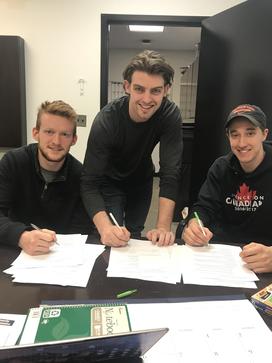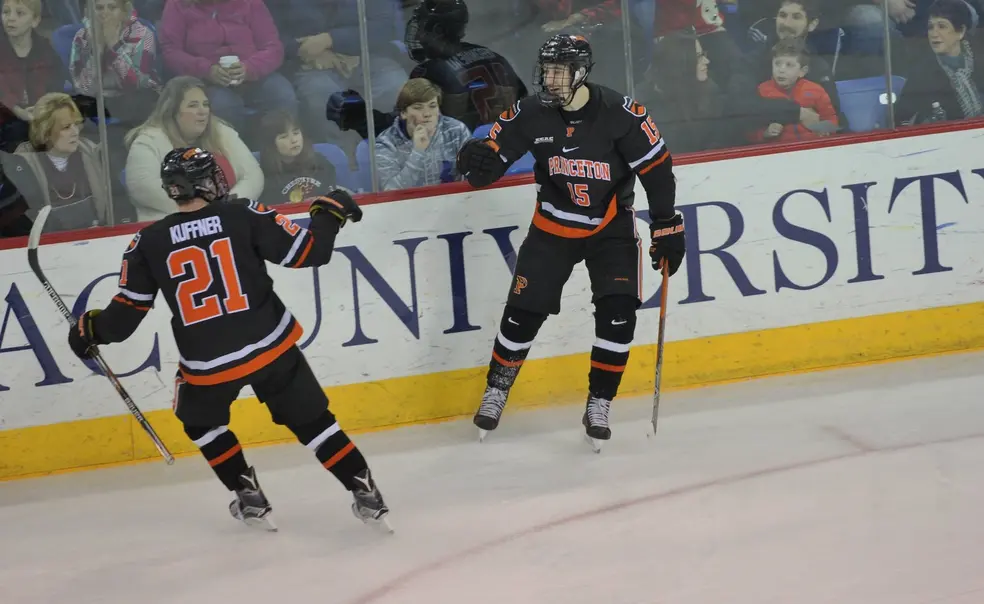During COVID, Two Hockey Alumni Push Each Other Toward the NHL
‘I want him to know that I’m working harder than him,’ Kuffner said
Long before they were Princeton teammates headed toward the NHL, an accident between Ryan Kuffner ’19 and Max Veronneau ’19 landed one of them in the hospital. They were nine, and Veronneau pushed Kuffner to the ground in a game of touch football, breaking his arm.
It’s been an ongoing joke ever since.
“He says I pushed him. I don’t know, I just think he’s a little weak on his feet,” said Veronneau.
“It was always a running thing, knowing that was the kid who broke my arm,” laughed Kuffner.
Despite that encounter, they’re now best friends who have 26 NHL games played between them, and currently play in the minor American Hockey League for NHL farm teams.
They’ve been working out in Kuffner’s backyard every morning throughout the COVID-19 pandemic, pushing each other to get faster and stronger with hopes of earning their way back into the major league full time.
“The whole point is to push yourself until you can’t do it, and that’s enough,” said Kuffner. “When you have someone there to go even further and you want to beat them in everything, it’s always going to push the threshold of how much I can do.
“I want him to know that I’m working harder than him.”
Veronneau and Kuffner grew up in the same Ottawa neighborhood, but they didn’t become friends until their teens, when both were overlooked by Ontario’s top junior league.
That league would have been a more direct route to the NHL. Instead, they proved themselves in a second-tier junior league, playing two seasons together with the Gloucester Rangers.
Both averaged well over a point per game in Gloucester and caught the attention of Princeton’s men’s hockey staff, but coach Ron Fogarty said it was their character, not the goals and assists, that really made an impression.
“There’s a lot of players who do extremely well in junior hockey, but if they don’t have the component of being a great person, you’re going to bypass them,” said Fogarty, who’s been coaching at Princeton since 2014. “As people, they were tremendous individuals that we could trust on and off the ice.”
They led the Tigers in scoring as linemates all four years of their NCAA careers. Both were intelligent players with a tremendous work ethic. Kuffner’s shooting and skill around the net coupled with Veronneau’s speed and playmaking put them among the best college players in the country.
They also worked hard off the ice, determined to take advantage of a Princeton education. When they weren’t skating, they were hitting the books.
“I think school really helped me out in a way because it was so challenging,” said Veronneau. “Learning how to work through adversity and everything, I think that really helped out my hockey game, too.”
The 2017-18 season, their junior year, was historic for both players.
Veronneau set the record for most points by a Tiger with 55, while Kuffner set the record for most goals with 29. They led Princeton to its first ECAC championship since 2008 with a 2-1 overtime win over Clarkson.
“I don’t think we realized the magnitude of it,” said Kuffner. “It was unbelievable, probably one of the best moments of my life.”
Both were Hobey Baker Award nominees after their senior years, and NHL teams took notice.

“Wow, this is happening, we’re going to play in the NHL,” said Veronneau. “It was a pretty surreal feeling, hard to describe it.”
Kuffner joined the storied Detroit Red Wings franchise and Veronneau signed with their hometown Ottawa Senators. Veronneau was traded to the Toronto Maple Leafs on Feb. 19; five days later Kuffner was sent to the Edmonton Oilers.
Despite playing games in the NHL, neither player has solidified his place. They’ll have to prove their worth in the minors first. Calling themselves “late bloomers,” they believe they have what it takes to make it into the top-flight permanently: the same work ethic they learned at Princeton.












No responses yet